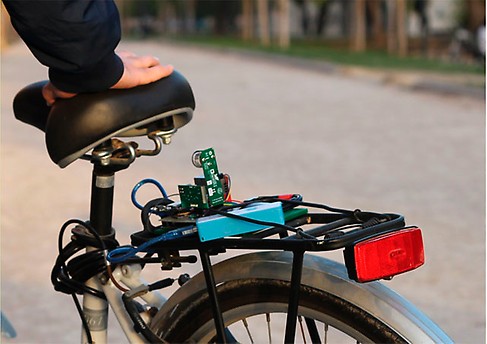Analog Devices (ADI), specialist in design and manufacture of electronic circuits and located in Spain in the University of Valencia Science Park, and Würth Elektronik (WE), manufacturers of discrete electronic components, have awarded three projects in First European University Design Contest that they have launched among engineering students. Out of the three, one is from the University of Valencia.
It is Green Mite, a team formed by Sebastián Mirasol, Adrián Suárez, Víctor Martínez and Gustavo Adolfo-Pérez, four students from the School of Engineering (ETSE) whose project aims to map pollution in cities through the installation of an electronic device in means of transport.
"The prototype contains sensors, supplied by the organizers of the contest, detecting carbon monoxide, carbon dioxide, particles (1 to 2.5 microns), temperature and humidity, and what we have developed is a tool to visualize the collected data, showing a heat map on the area where we did the tests and representing the concentrations in a visual way, in addition, a graph with the time evolution of each measured parameter is represented ", Sebastián Mirasol has explained.
Asked about its advantages, Adrián Suárez has stressed that Green Mite "really has two: on the one hand, the monitoring of air quality in a city, if installed, for example, on the roof of municipal buses, would collect data on part of the city, and on the other hand, the tool would allow estimating the carbon footprint at the household level, taking into account electricity consumption, water consumption and the number of supermarkets in the district". "The applications of such a tool are very diverse, because it can be used to monitor urban areas, to enforce environmental laws by districts or at the level of estimated emissions from home," Victor Martinezand Gustavo Adolfo-Pérez added.
"It is the group that has come the longest in the execution of the device, they have a finished and functional system that could be placed in mobile devices such as cars, buses, and even in the public bicycle service of València -Valenbisi-, and thus capture the pollution data of the city In fact, their highest score and where they have managed to distinguish themselves from other projects is in applicability, it was one of the requirements, we asked for business relevance ", has underlined Javier Calpe, promoter of this challenge and responsible for Analog Devices Center of Development in Spain, located in the University of Valencia Science Park.
The competition has also recognized the work of the Health Ear project presented by the team formed by Daniel Iordanov, Andima Beitia, Javier Silva and Roque Belda, students of the Universitat Politècnica de València. "Its purpose was to reduce the amount of noise that reaches the eardrum, especially in the case of some professions or environments. To achieve this, they have designed an apparatus that is placed on the ear and minimizes it dynamically. This reduction is made according to the characteristics of the noise and adapts it to the sensitivity of each person in particular", Miguel Usach, applications engineer at Analog Devices Spain, has said.
The third recognized project is Eppendorf, from the University of Limerick. "This team has developed a functional system for temperature control for the characterization of liquids in medical and biomedical environments. It is a very expensive system and this development would allow it to be used by more university research groups", Javier Calpe indicates.
Encorauge proactivity
The selection of the three winners has been responsibility of a jury made up of three very senior engineers from Würth Elektronic and another three chosen from the Analog Devices centers in the United States and Ireland. The six experts should have evaluate them according to the criteria of innovation, creativity and originality, applicability, use of ADI and WE materials, social media interaction and interdisciplinary team.
"The objectives of this challenge have been three," Javier Calpe has said. "We want to encourage the participation of students in proactive activities that complement their training; we seek to collaborate with universities by providing topics and relevant materials for final projects of degree and master; and also, we make our companies better known among university students as possible new members to the teams of Analog Devices and Würth Elektronik".
The awards ceremony will take place next Friday April 4 in Munich (Germany), a city where the two multinationals have their own headquarters. Once the acknowledgments have been delivered, "the students will decide how they want to continue developing their project and if they want both Würth Elektronik and us to support them as accelerators. The intellectual property of the three prototypes belongs to the university groups", the head of Analog Devices in Spain has explained.


